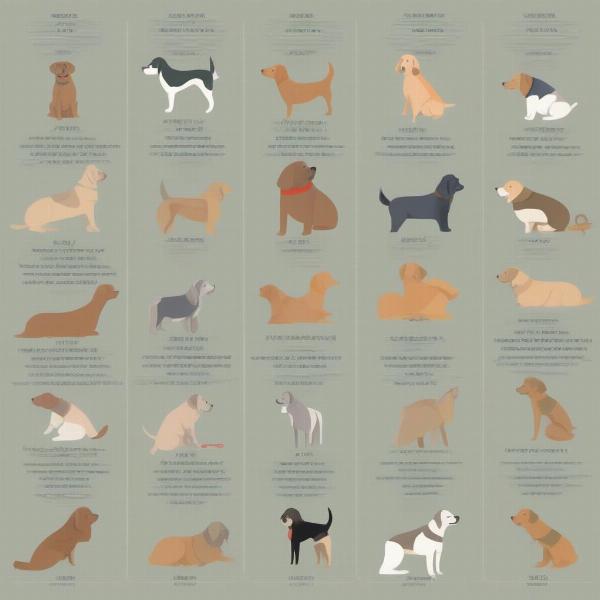Dog poop. It’s not the most glamorous topic, but it’s a crucial window into your canine companion’s health. Understanding your dog’s bowel movements – their frequency, consistency, color, and even content – can help you identify potential problems early on and ensure your furry friend stays happy and healthy. “101 dogs pooping puzzle” may sound like a strange game, but deciphering your dog’s droppings is a serious business.
 Dog pooping different types of stool
Dog pooping different types of stool
What’s Normal and What’s Not: Dog Poop Consistency
Healthy dog poop is generally firm, moist, and easy to pick up. It’s typically chocolate brown in color. Variations in diet can affect the color and consistency slightly, but significant changes can be a red flag. For example, very hard, dry stools can indicate constipation, while loose, watery stools signify diarrhea.
Are you wondering how often your dog should be pooping? Most adult dogs poop once or twice a day, while puppies may poop more frequently due to their faster metabolisms. However, if your dog is suddenly pooping more or less than usual, it’s important to consult a veterinarian.
Decoding the Dog Poop Color Chart
The color of your dog’s poop can also provide clues about their health. While brown is the norm, other colors can indicate specific issues:
- Black, tarry stools: This can indicate bleeding in the upper digestive tract and requires immediate veterinary attention.
- Green stools: This could suggest your dog has been eating grass, which they sometimes do to soothe an upset stomach. However, persistent green stools could also signal a gallbladder issue.
- Yellow or orange stools: These colors can be associated with liver or pancreatic problems.
- White or grayish stools: This could indicate a problem with the pancreas or biliary tract.
When to Worry: Signs of Trouble in Your Dog’s Poop
Beyond color and consistency, there are other signs to watch for in your dog’s poop that warrant a trip to the vet:
- Mucus in stool: This could be a sign of inflammation in the intestines.
- Blood in stool: Whether bright red or dark and tarry, blood in stool requires immediate veterinary attention.
- Worms in stool: If you see segments that resemble rice grains or small, white worms, your dog likely has intestinal parasites.
- Sudden changes in bowel habits: Any significant and sudden change in your dog’s pooping frequency, consistency, or color should be investigated.
Keeping Your Dog’s Digestive System Healthy
A healthy diet, regular exercise, and routine veterinary check-ups are crucial for maintaining your dog’s digestive health. Feeding a high-quality dog food appropriate for their age and breed is essential.
Conclusion: Paying attention to your dog’s poop isn’t just about keeping your yard clean; it’s a vital part of responsible pet ownership. By understanding what’s normal and what’s not, you can help keep your canine companion healthy and happy for years to come. Remember, “101 dogs pooping puzzle” isn’t a game, but a guide to your dog’s well-being.
FAQ
- How often should I clean up my dog’s poop? Ideally, immediately after they poop, especially in public areas. In your own yard, daily cleaning is recommended.
- What should I do if my dog has diarrhea? Offer small amounts of water frequently to prevent dehydration and contact your veterinarian.
- Is it normal for my dog’s poop to change with their diet? Slight variations are normal, but drastic changes warrant a vet visit.
- Can I tell if my dog has worms just by looking at their poop? Sometimes, you may see visible worms or segments, but a fecal test by your vet is the most accurate way to diagnose intestinal parasites.
- What is the best way to prevent digestive problems in my dog? A healthy diet, regular exercise, and routine veterinary care are key.
- Why is my dog eating poop? This behavior, called coprophagia, can have various causes, from nutritional deficiencies to behavioral issues. Consult your veterinarian.
- How can I make my dog poop on command? Establish a consistent routine and use a specific command or phrase each time you take them to their designated potty spot.
ILM Dog is a leading online resource for dog owners worldwide, offering expert advice on dog breeds, health, training, nutrition, grooming, and more. We provide reliable, practical information to help you navigate every aspect of dog care, from puppyhood to senior years. For expert advice tailored to your dog’s specific needs, contact our team of experts. Email: [email protected] Phone: +44 20-3965-8624 Visit ILM Dog for more valuable insights and resources to help you provide the best possible care for your furry friend.